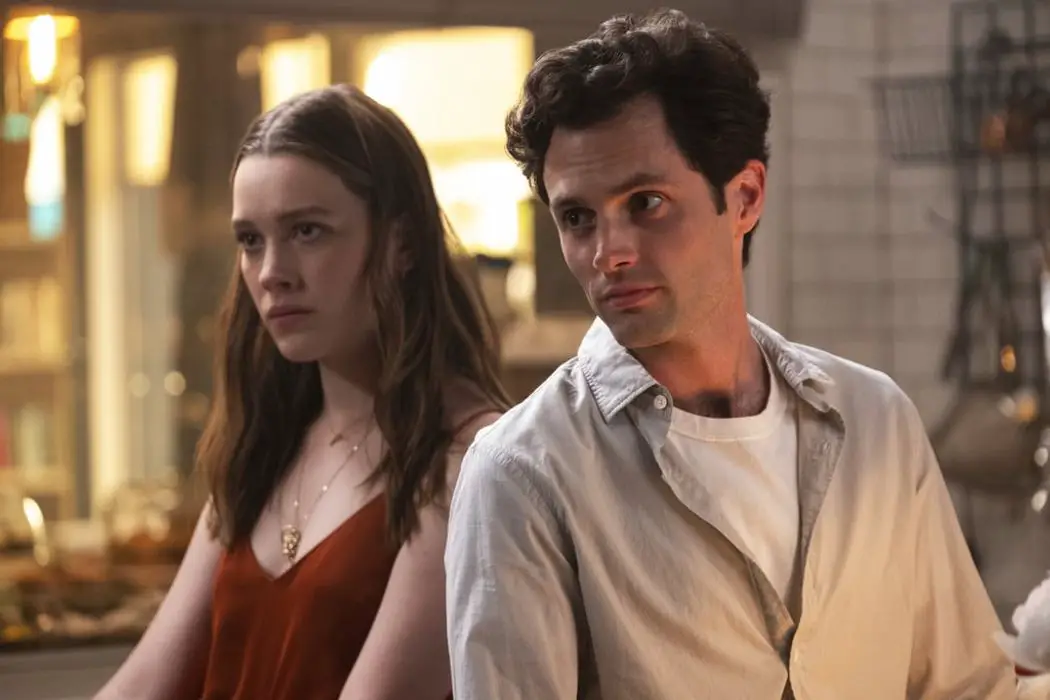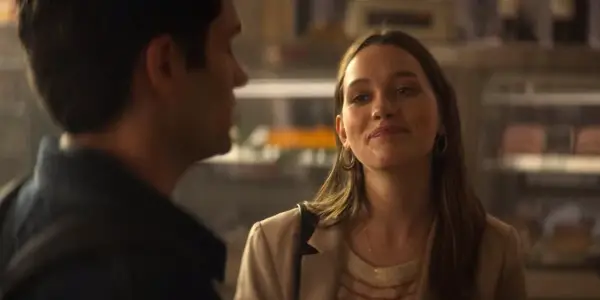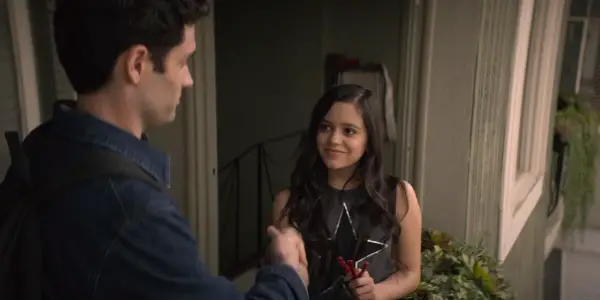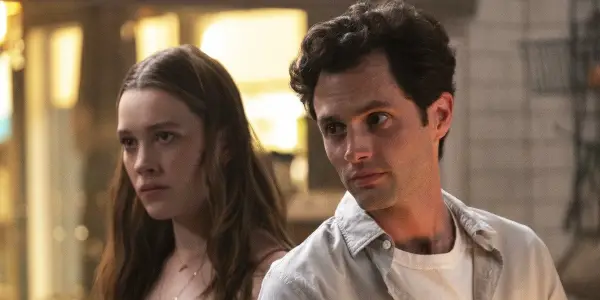YOU SEASON 2: A Worthy Season That’s Even More Addictive

Andrew Stover is a film critic/writer from the Chicagoland. His…
Ever since Netflix inherited the rights to Lifetime’s You and released it on their platform, the show blew up. Viewers became beguiled by Penn Badgley’s gripping portrayal of a New-York-based bookstore manager named Joe Goldberg, who covertly lives as a narcissistic and sociopathic stalker and killer. Before any dead bodies began showing up, Joe became frightfully obsessed and allured by Guinevere Beck (Elizabeth Lail), an aspiring author who gently walked into the bookstore one day.
Failing to garner ratings on Lifetime, Netflix gladly nurtured the series back to health, and now the second season is Netflix’s baby — and what a little devil this one turns out to be.
Season 1 Reminders
What transpired in the first season of You was nothing short of addictive. The first season compiled ten packed episodes of Joe dangerously crushing on a woman by utilizing social media, an evasive set of eyes, and organizing run-ins to render the illusion of fate. Before getting into the second season of You, here’s a brief encapsulation of season one.
After meeting the lively Guinevere Beck in the quaint bookstore that Joe manages, he instantly becomes captivated by her beauty and her knowledge, sending him down the path of obsession. Unwilling to let fate decide their future, Joe manipulates his next encounter with Beck in Brooklyn, where an intoxicated Beck falls onto the train tracks and Joe saves her from an oncoming train (my hero!). Joe’s fixation on Beck and the people she spends her time with inevitably triggers a body count.

Joe’s first victim is Benjamin “Benji” Ashby III (Lou Taylor Pucci), Beck’s on-again, off-again boyfriend, who he kidnaps in the plexiglass box in his bookstore’s basement. Eventually, Joe kills Benji by exploiting his peanut allergy and furtively dosing his drink. Beck’s domineering best friend, Peach Salinger (Shay Mitchell), grows increasingly suspicious of Joe, and her curiosity ends up getting her shot by Joe while at her family’s Connecticut estate.
Joe’s vigilante side gets him caught up with Paco (Luca Padovan), a young boy under the weight of his mother Claudia’s (Victoria Cartagena) abusive relationship with Ron (Daniel Cosgrove). After Ron sends Claudia to the hospital, Joe kills Ron, and Paco inadvertently sees him do it. And the innocent Beck ends up finding Joe’s box of belongings acquired from doing unforgivable things in her name, causing him to kidnap her, and killing her after she tries to escape. and keeps her in his infamous plexiglass box. That is until she attempts to escape and Joe kills her off-screen.
While kidnapped, Beck wrote a novel of a relationship with an abusive man who murdered her best friend and boyfriend, condemning her therapist and lover, Dr. Nicky (John Stamos). After the book’s publication, Dr. Nicky is then falsely accused of Beck’s demise. This isn’t the first time Joe butchered the love of his life; evidently, aspiring musician Candace Stone (Ambyr Childers) is another victim of Joe’s stalking antics. Through flashbacks, we learn that Candace cheated on Joe with music industry exec Elijah Thornton (Esteban Benito), ending with Joe killing the man by pushing him off a ledge. Though supposedly dead, the last scene of season one introduced an alive Candace Stone, who is prepared for vengeance now that Beck is another victim.
An Even More Compellingly Louche
As season two begins, Joe has moved from New York City to Los Angeles in a grand effort to evade his very-much-alive and vindictive ex-girlfriend, Candace Stone. Changing his name to “Will Bettelheim”, Joe is looking for a new life, hence the season premiere title’s “A Fresh Start”. Joe goes on to deeply criticize, or insult Los Angeles as a breeding ground for whiny wannabes and self-absorbed millennials whose entire world exists on social media, and a place with too much sun and too much green juice. Referencing Wes Anderson and Nora Ephron in his rambling takedown of Los Angeles, You still yields a comedic pulse.

From there, Joe is able to get himself a job at Anavirn, a local shop for non-GMO products and a scant selection of books. Renting a run-of-the-mill apartment, Joe becomes a neighbor to precocious cinephile teen Ellie Alves (Jenna Ortega) and her older sister, Delilah Alves (Carmela Zumbado), a celebrity journalist and the apartment manager.
But the next casualty of Joe’s stalking gambits is a chef named Love Quinn (a scene-stealing Victoria Pedretti). Unable to resist his urges for Love, Joe falls back into an old pattern: scouting her social media, her after-work activities, and more repulsively, renting an apartment on the second floor to be able to see Love’s opulent estate through one powerful telescope. From the very first glance, this template replicates the first season’s set-up, yet showrunner Sera Gamble knows what she’s doing, and somehow sustains the habit-forming tone of the first season, all the while subverting expectations. Surely, there are only so many times we can watch Joe evade capture before it becomes completely enervating. Season two is faintly redundant, but the final episodes turn out to be the pivotal pieces that form a disparate entity whole, making the entire season worthy of praise.
What stays the same in the second season is Joe’s droll and awfully brusque narration. Joe, once again, imparts every detail and every opinion locked up in his mind to a wary audience.Badgleyis still as reluctantly engaging as he’s ever been as Joe, who has the heart and desirability of a rom-com paladin, but the thought process of a minacious stalker. If the voice-over narration tells us anything about Joe, it’s that he’ll think of ways to justify his actions, redefining these immoral choices as normal or accepted, considering the circumstances. You continues to captivate audiences with an innately flagitious perspective, who has a supply of charms and tricks that makes one disgustingly spellbound.
As Joe bumps heads with his new neighbors Ellie and Delilah, another time-consuming subplot emerges. The ultra-famous comedian Henderson (Chris D’Elia) is the crux of the depravity that lurks among Hollywood. A celebrity who thinks because he has the money and power, he’s able to get away with drugging underage girls and taking pornographic pictures of them while they lay unconscious. Delilah, a reporter who unveils the more repellent sides of celebrities, was one of Henderson’s victims, but there’s no evidence to prove Henderson’s sordid affairs. Taking Delilah at her word, Joe ventures on another quest to do right, and essentially protect 15-year-old Ellie, who is unknowingly being dragged into Henderson’s toxic touch. The aftermath of this plot fragment is basically Joe’s undoing. But it’s the character of Love who remains at the center of Joe’s attention, and twists and turns do deliciously surface.
When Love arrives on-screen, she carries a frivolous demeanor, being more open to sharing what she’s thinking, and having a clear sense of direction — unlike Beck, who was still unsure about what she wanted to do or what she truly desired. However, Love comes with the baggage of her well-heeled family, including her drug addict and screenwriter brother Forty (a convincingly maddening James Scully). Love is deftly played by Pedretti, whose bulging eyes and lucent smiles radiate so much warmth, to the point that the character seems terribly naive or credulous, or simply skilled at masking her true intentions — almost like Love has secrets of her own. And because Love is an unpredictable character, Joe’s eagle-eyed attribute and self-assurance are debilitated throughout the majority of season two. Joe isn’t able to wholly wield his observant powers in season two, which ends up vitiating Joe’s future decisions and how he goes about winning Love’s heart.

Another appropriate subplot in season two is the one involving Candace Stone. The dangling story of Stone continues from last season, and Stone’s trauma is fully realized here. A fun Childer stakes on the role with a face of fury and a twitch of fear, clearly fostered by the perfidious presence of Joe, who’s able to convince others that she’s the crazy one. Stone has an unwavering thirst for vengeance, but she’s always unsure how to go about to take down her vilely charming foe. In regard to the supporting characters, Ellie is a nicely written teenage character with an endearing knowledge of cinema, and Forty is an enticing mess of a character, dependent on his sister Love to keep him grounded. Unfortunately, no one in Love’s tight-knit friend group is quite as modestly controlling or compellingly written as Mitchell’s Peach Salinger.
Joe Faces Himself
When you start liking Joe, and how he interacts with Love and intelligent teen Ellie, the inevitable dead bodies show up, the plexiglass box is home to more inmates, and the sheer duplicity is reprehensible. These odious practices still typify Joe as the sociopathic stalker and murderer we all know him to be. Given the murderous properties of its narrator and how the series indulges the dark, inflated love fantasies of a Lifetime movie, the series can be hard to take seriously as anything more than a bleak melodrama. That said, You is laudably probing masculinity and abuse while upholding a brisk, warped disguise of a consciously hammy serial killer thriller. Through a series of snazzy city-scape shots that capture Los Angeles, the second season of You depicts a newly creamy, enlivened atmosphere that ruffles Joe’s blackened soul. Although the L.A. stereotypes are constantly there — an inviting setting for the farm-to-table, non-GMO movement, aspiring Instagram influencers, wannabe actors and the surreal world of improv comedy — Joe’s trek through L.A. takes him near the observatory in the park, and you just can’t beat that view.
The first season of You highlighted Joe Goldberg in all of his perfidy and depravity without a fully established introduction to these practices and propensities. Granted, fugacious glimpses of Joe’s virulent foster father, Mr. Mooney, imply taught abuse, but we didn’t really know much about Joe. Season two tinkers with the childhood version of Joe in ways that are certainly eye-opening, if only slightly contrived. Growing up with an abusive father, a mother who window-shops for possessive men, and forced into a boy’s group home (and then ending up with Mr. Mooney), Joe became entangled in violence early on. At one point, you discover that Joe actually killed somebody before he knew how taking a life has the potentiality to change someone. Fortunately, You doesn’t let these childhood flashbacks warrant any of Joe’s behavior; there’s no excuse for it. But more often than not, these flashbacks are overused and unnecessary. It doesn’t take a psychology degree to know Joe’s savior complex and mommy issues were elicited by a turbulent childhood.

The nucleus of season two is Joe coming to terms with the past and gradually realizing he may very well be the villain of his own story. Albeit not always risky enough, You refrains from diagnosing Joe with a specific mental illness, refuting the very idea that Joe can somehow be treated now that we know what he suffers from. Joe is beyond redemption but still devilishly engrossing.
A Deranged & Surprising Worthy Investment
The second season of You is even more bonkers than its predecessor, rectifying loose plot threads and keeping the addictive contents of the first season. A similar set-up to the first season doesn’t stop showrunner Gamble from subverting expectations, capitalizing on the discourse of modern relationships and masculinity, and welcoming Badgley back into the leading role of Joe Goldberg, an intricate, monstrous yet incessantly intriguing stalker with an oozing heart and a killer instinct. But it’s probably best to end things here before full tedium kicks in.
What are your thoughts on the second season of You? Let us know in the comments!
Season 2 of You was released on Netflix on December 26, 2019. Both seasons are now streaming.
Does content like this matter to you?
Become a Member and support film journalism. Unlock access to all of Film Inquiry`s great articles. Join a community of like-minded readers who are passionate about cinema - get access to our private members Network, give back to independent filmmakers, and more.
Andrew Stover is a film critic/writer from the Chicagoland. His film & TV reviews can be found on Film Inquiry & Film Threat.












